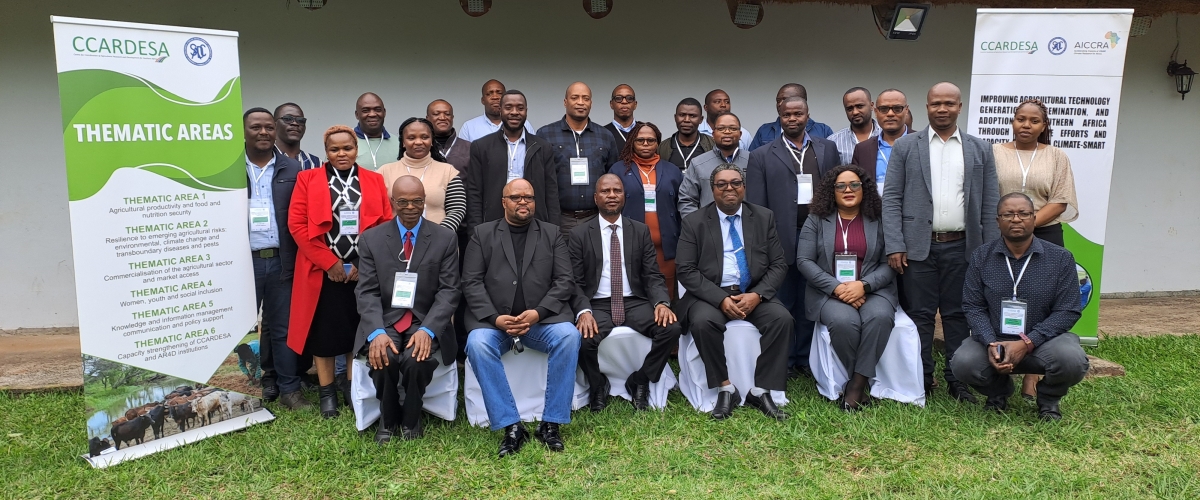
By Phumelele Mkhonta
In a bold step towards improving climate-smart agriculture and climate information services, Eswatini is in the process of enhancing agrometeorology systems. The Centre for Coordination of Agricultural Research and Development (CCADERSA), with support from the Accelerating Impacts of CGIAR Climate Research for Africa (AICCRA), brought together 21 (7F:14M) scientific experts from the Ministry of Agriculture, National Meteorological Service, Academia, National Disaster Management Agency, Early Warning Unit and Department of Agricultural Research Services for a Training of Trainers (ToT) Workshop at the Sibane Sami Hotel in Ezulwini, Eswatini, from 12 – 16 May 2025.
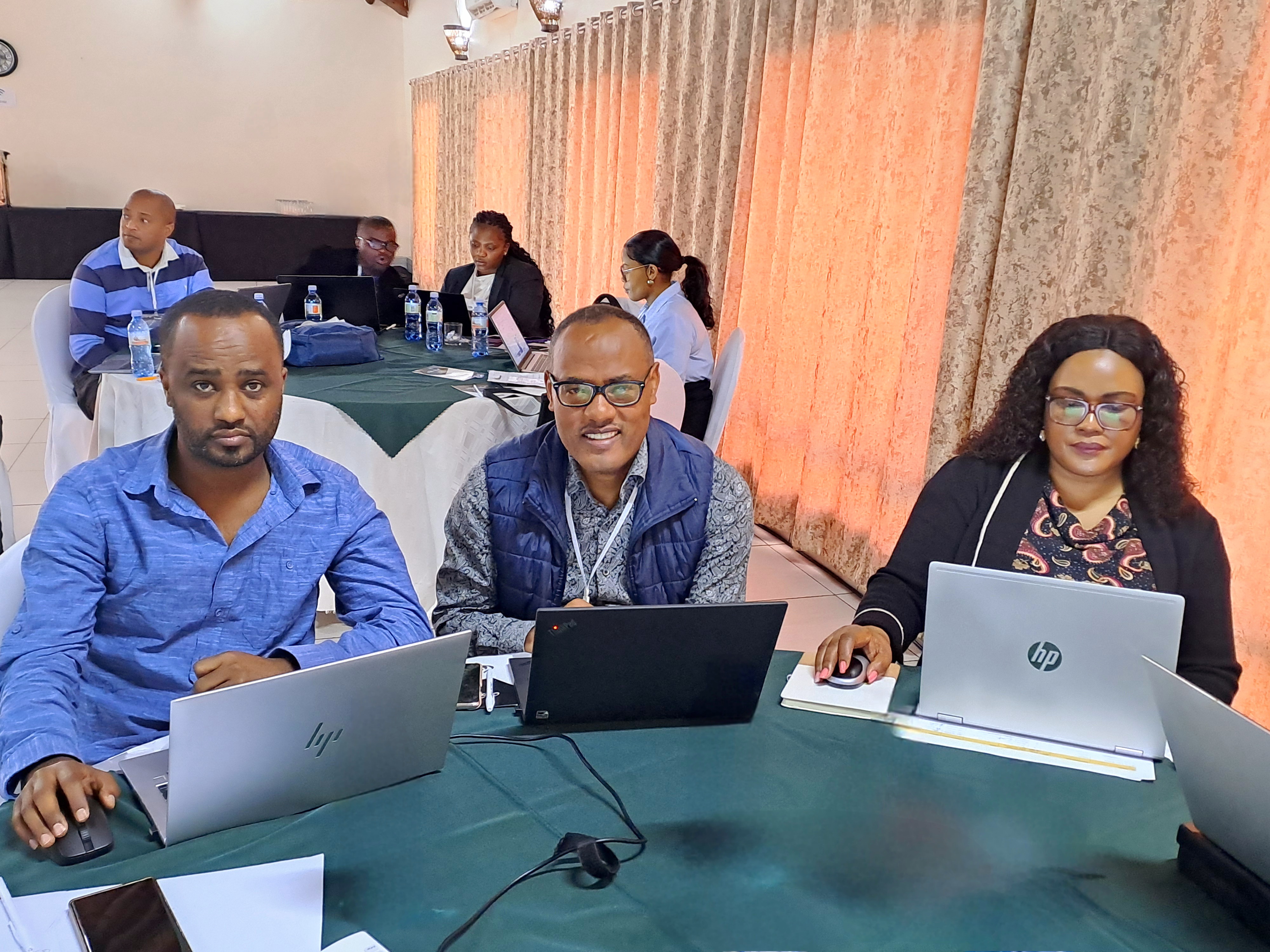
The African Climate Policy Centre (ACPC) of the United Nations Economic Commission for Africa (UNECA) developed an analysis framework to assess the Socio-economic Benefits (SEB) of Climate Information Services (CIS) for an effective and comprehensive multi-hazard early warning and action system in the disaster risk reduction sector. Taking into account the SEBs Framework, following the devastation of Tropical Cyclone Idai in Malawi, Mozambique and Zimbabwe in March of 2019, in response to Ministers of the affected countries, ACPC commissioned the development of a user-friendly climate-informed crop prediction tool that supports decision-making in building resilience of the food systems against the impacts of climate change.
Participants were trained on a methodology for predicting crop capability and yield in various agroecological zones to enhance agricultural productivity and food security. In this regard, crop capability and yield prediction modelling platforms use the Climate-Agriculture Modelling and Decision Tool (CAMDT) as the weather generator, i.e., it is an algorithm for temporal downscaling. CAMDT is used to drive the Decision Support System for Agrotechnology Transfer (DSSAT), the crop weather simulation model. This Tool provides up to three months' lead time, i.e., a planning window before the cropping season.
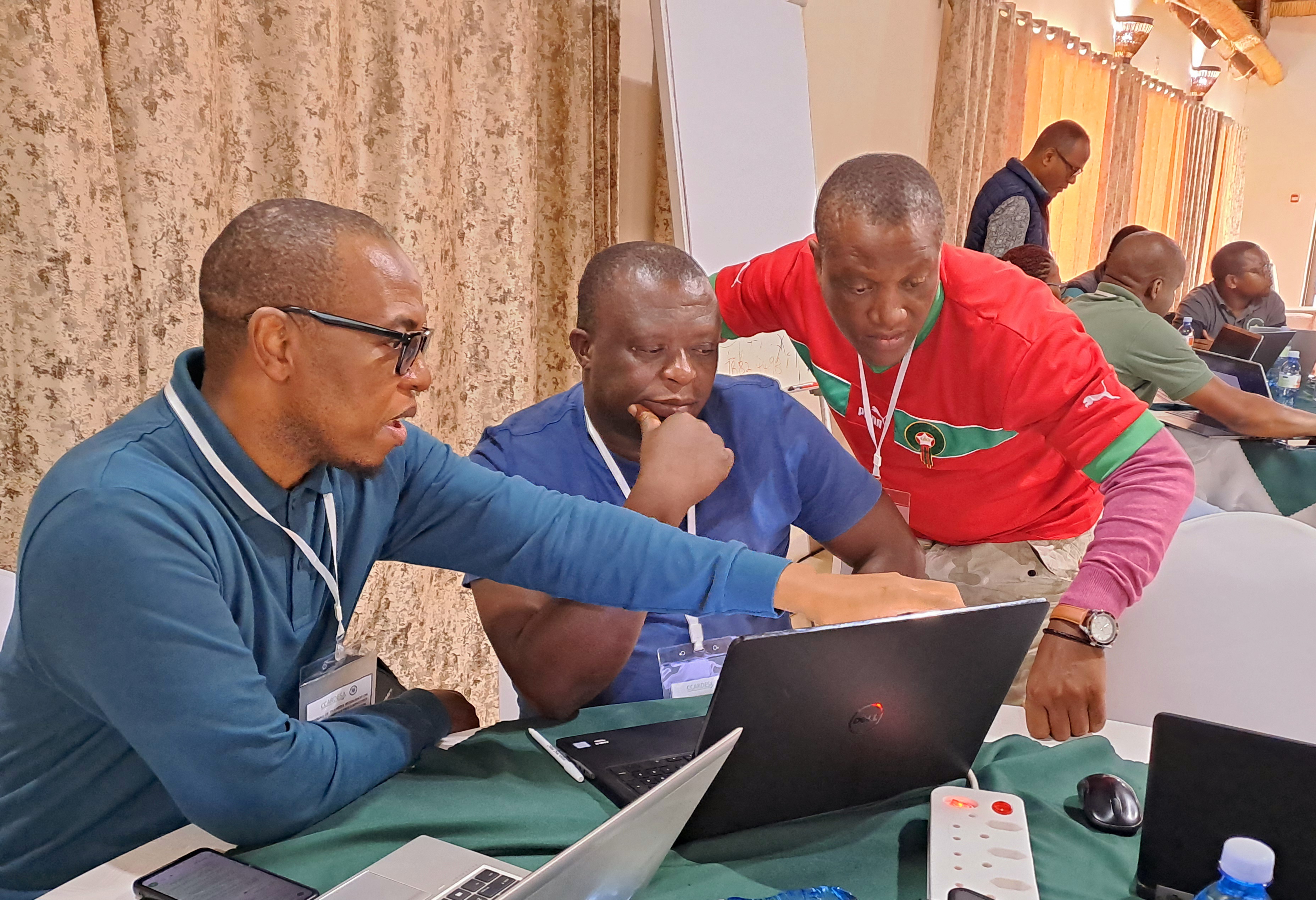
The objective of this training programme was to enhance understanding of the impacts of climate variability and climate change, equipping experts from different institutions with the necessary knowledge to make strategic management decisions aimed at mitigating risks associated with adverse climatic conditions while optimizing agricultural productivity that helps smallholder farmers better adapt to climate change and variability. To further efforts in risk reduction within agricultural systems, the training will concentrate on the generation and application of Climate Information Services (CIS). These services will deliver advanced advisories on climate dynamics and their implications for crop management practices. The outcomes of this workshop are designed to provide significant benefits to policymakers and user communities in deciding on the most up-to-date crop capability based on seasonal climate forecast (SCF). This will, in turn, help smallholder farmers to make informed decisions about what to plant, when, and how to manage resources efficiently. The tool helps reduce risks of crop failure, optimize input use, and improve income stability by forecasting yields and supporting market planning that enhance farmers' resilience to climate change by guiding sustainable practices and helping farmers adapt to shifting weather patterns.
The integration of the Decision Support System for Agrotechnology Transfer (DSSAT) with Seasonal Climate Forecasts (SCF) offers a significant opportunity to predict crop yields within the growing season, thereby facilitating the agriculture sector's adaptation to climate change. Empirical results from DSSAT crop models suggest that approximately 20-80% of the inter-annual variability observed in crop yields across Sub-Saharan Africa is attributable to weather-related phenomena, while climate variability is responsible for an estimated 5-10% of agricultural production losses.
During the opening ceremony, Honourable Mandla Tshawuka, the Minister of Agriculture, emphasized the critical role of the workshops in managing climate-related risks in the agricultural sector. He further expressed gratitude to CCARDESA for its leadership in coordinating regional research efforts. The Minister reiterated the government's commitment to climate action under the "Nkwe" mandate, which aims to eradicate hunger and poverty in Eswatini in the shortest possible timeframe, as advocated by His Majesty King Mswati III. Furthermore, this priority is woven into all national development frameworks and aligned with the Sustainable Development Goals (SDGs), reflecting our holistic approach to sustainable development.
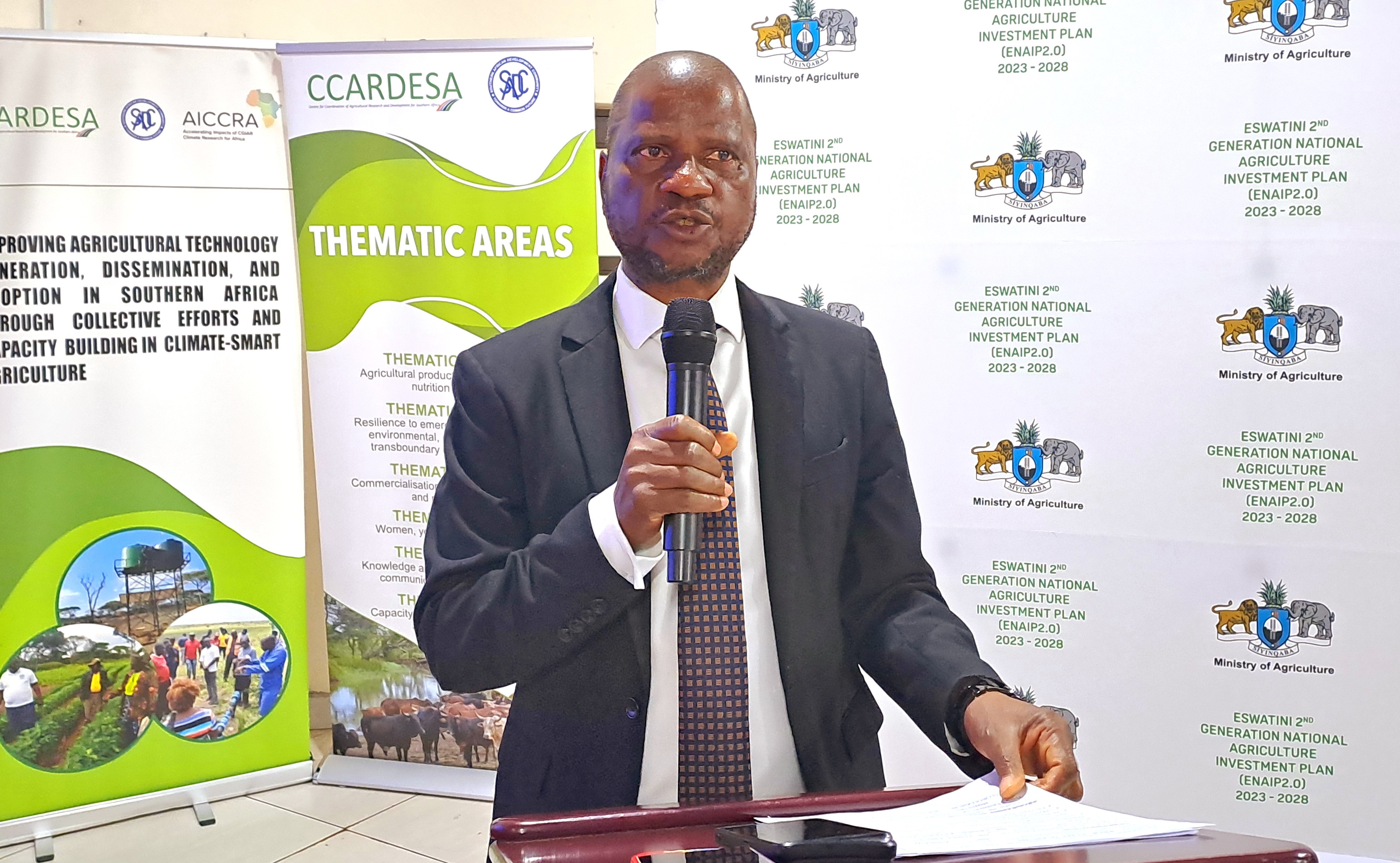
Honourable Mandla Tshawuka
“This tailor-made information will assist farmers to make management decisions that will minimise the risks, optimise benefits, and take advantage of opportunities arising from the variable climate,” said the Minister. Minister Tshawuka then urged the experts to ensure that models and tools espoused were adapted to the Eswatini scenario, the agricultural advisories are delivered in a timely manner, and smallholder farmers and rural communities have access to the advisories.
Dr Yosef Amha, on behalf of Dr James Murombedzi, Chief of the African Climate Policy Center at the United Nations Economic Commission for Africa, started his opening remark by recalling the journey taken to develop the crop capability model. The model was developed as part of the UNECA’s building-back-better efforts in response to the torrential rains and howling winds of Tropical Cyclones Idai and Kenneth, which devastated Mozambique, Malawi, and Zimbabwe in 2019. This model aims to contribute to rebuilding bottom-up, science-informed, and demand-driven climate resilience in these countries and beyond.
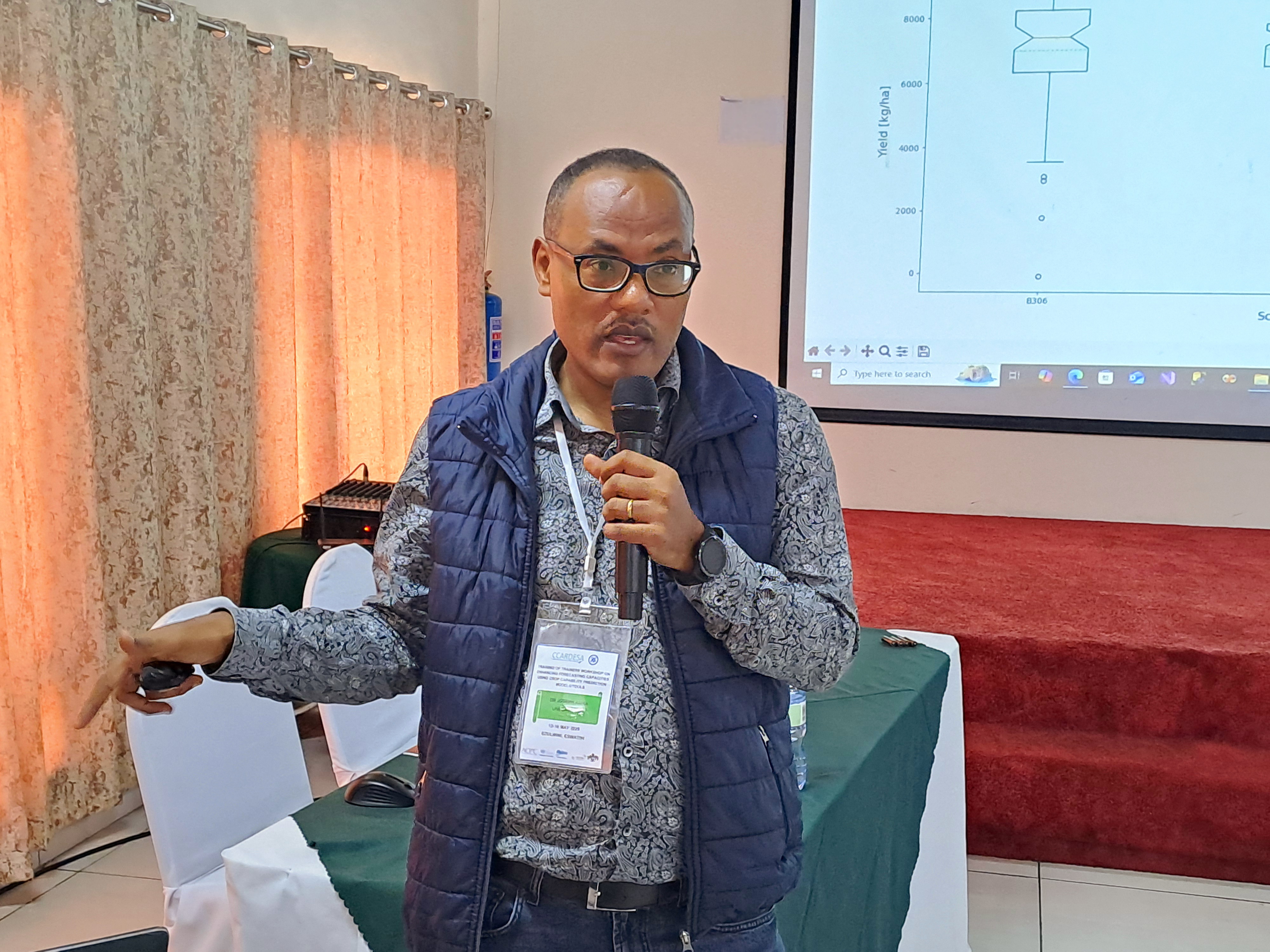
Dr Yosef Amha
In his opening remark, Gebermedihin Ambaw, on behalf of Dr Dawit Solomon, AICCRA Eastern and Southern Africa and Ethiopia Program cluster Leader, said, “Predicting crop capability and yield accurately is more critical than ever. With climate variability, changing weather patterns, and increasing natural resource pressures, farmers and policymakers need reliable, data-driven tools to guide planting decisions, resource allocation, and food security planning. This is where crop yield prediction models play a transformative role, enabling smarter agriculture that is both productive and resilient.” He added that “AICCRA is proud to support this initiative with CCARDESA, ACPC, WMO, Digitron Business Systems, and other strategic partners because it aligns with our mission: to bridge the gap between climate science and practical action. “
In the meantime, the CCARDESA Executive Director Professor Cliff Dlamini shared insights on forecasting and agroecological zoning in Eswatini, stating that they needed to be reviewed. He said this in an interview during the training of trainers. The ED emphasised the shifting nature of weather patterns due to climate change. He acknowledged that weather forecasting may no longer be consistently accurate, urging farmers and agricultural stakeholders to adapt and build resilience. The Executive Director also highlighted CCARDESA’s commitment to initiating regional dialogues on agroecological zones, as climate change continued to redefine seasons and geographical boundaries across Southern Africa.

Professor Cliff Dlamini
“After this workshop, we still need to come back to Eswatini and have a serious discussion on geographical regions and their possible rezoning. Climate change has evolved everything we thought we knew, and we should adapt accordingly,” said Professor Dlamini.
It is worth noting that so far, CCARDESA's initiatives have reached 4.61 million beneficiaries. Additionally, 97,000 farmers have been trained, 3,720 value chain actors are accessing climate-smart agriculture, and 41,300 farmers have received support.
The author is an Environmental Journalist in Eswatini






